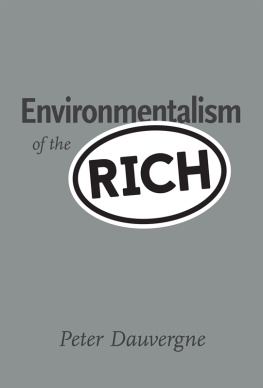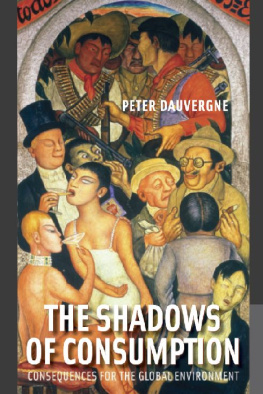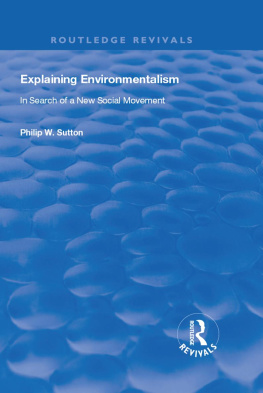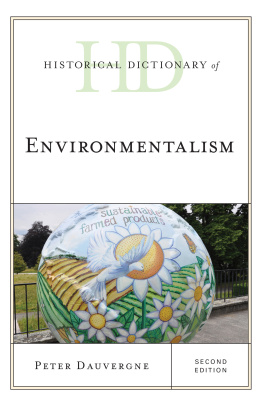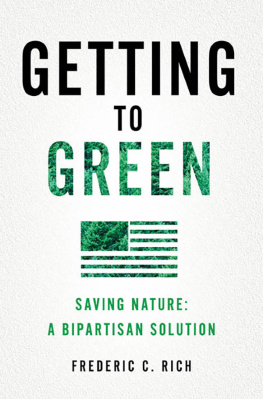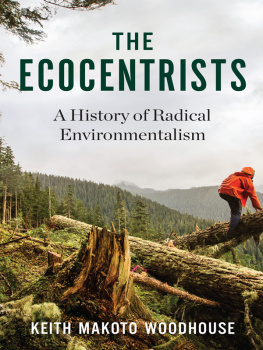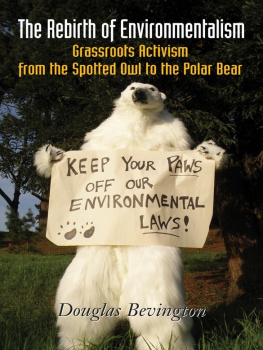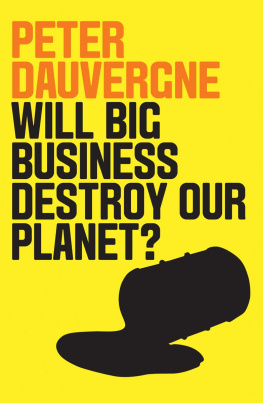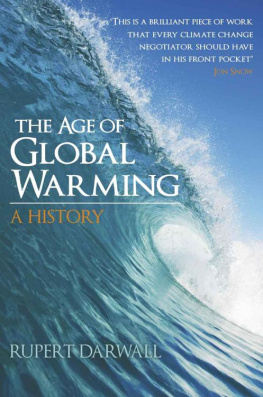I Global Unsustainability
II Global Environmentalism
Environmentalism of the Rich
Peter Dauvergne
The MIT Press
Cambridge, Massachusetts
London, England
2016 Massachusetts Institute of Technology
All rights reserved. No part of this book may be reproduced in any form by any electronic or mechanical means (including photocopying, recording, or information storage and retrieval) without permission in writing from the publisher.
This book was set in Stone Serif and Stone Sans by Toppan Best-set Premedia Limited. Printed and bound in the United States of America.
Library of Congress Cataloging-in-Publication Data
Names: Dauvergne, Peter, author.
Title: Environmentalism of the rich / Peter Dauvergne.
Description: Cambridge, MA : The MIT Press, 2016. | Includes bibliographical references and index.
Identifiers: LCCN 2016010268 | ISBN 9780262034951 (hardcover : alk. paper)
eISBN 9780262336215
Subjects: LCSH: EnvironmentalismEconomic aspects. | Environmental degradationEconomic aspects. | Consumption (Economics)Environmental aspects.
Classification: LCC HC79.E5 D3463 2016 | DDC 333.72dc23 LC record available at https://lccn.loc.gov/2016010268
ePub Version 1.0
In memory of Pablo (15991607),
with remorse
for kidnapping
and christening you Pablo
Acknowledgments
Looking back I can now see this book began to take form in the summer of 1972. That was when my family moved from Montreal to Hacketts Cove, a fishing village on the South Shore of Nova Scotia, Canada. It was an enchanting place for a boy of seven. In front of my house, crabs scurried over a rocky shore of periwinkles and mussels; in the marsh behind, frogs croaked like an orchestra. Some of my fondest memories of this time are of deep-sea fishing with my father and Kenny Green, a local fisherman.
Decades have drifted by since I was last in Hacketts Cove, or the neighboring village of Indian Harbour where my family would later move. Cod was the backbone of these village economies. I remember the marine biologists and conservationists who would wander through to decry overfishing. Even more vividly I recall how angry locals were that foreign trawlers were raking the sea of life. Yet few foresaw how swiftly Atlantic cod stocks would collapse in the early 1990s, or how severely the closure of the cod fishery would wound these communities.
My time in Nova Scotia left me with a deep respect for nature as well as admiration for people who live off the land and sea: to this day foundations of my understanding of environmentalism. My childhood also left me with a nagging anxiety about the ability of adults to control the world around us. Why, I have never stopped wondering, did those in charge not avert this tragedy? How did they not hear the cries of alarm of so many? How could reasonable people consume away 99 percent of a species once so plentiful?
To this day the adults in charge are still failing to prevent the world around us from descending into an ever-greater environmental crisis. The collapse of Atlantic cod stocks is just one sign. More than three-quarters of the worlds commercial fish species are now in or near biological crisis. And were equally failing to rein in agricultural pollution, biodiversity loss, chemical contamination, climate change, deforestation, desertification, freshwater loss, ocean acidification, plastic waste, and transboundary pollutants.
I no longer recall when I became an environmentalist worrying about such things. Perhaps it was on one of those glorious days out on the Atlantic Ocean with my father. Perhaps it was even the day we nearly capsized as we failed to haul aboard a 2,000-pound ocean sunfish, giving up after our harpoon rope snapped, watching the sunfish sink slowly out of sight, the harpoon jutting up like a flagpole. Since as long as I can remember Ive been trying to make sense of what those in charge, now somehow including me, are doingand not doingto live in greater harmony with nature. My conclusions in this particular book are tough minded, pointing to serious failings and worrying trends in how were doing as a species, and highlighting my concern that the interests of those with wealth and privilege are increasingly coming to dominate the demands of environmentalism. Still, I want to be clear that I remain proud to be an environmentalist and continue to see environmentalism as a whole as a progressive philosophy and an important social movement. Im not throwing environmentalists overboard, but I am wanting to see us make more of a difference.
Over the past few years many colleagues and friends have helped to inform my understanding of the power of environmentalism. In particular I owe my coauthors who have taught me so much over the past few years: Justin Alger, Jen Iris Allan, Jennifer Clapp, Sara D. Elder, Dborah Barros Leal Farias, Jonathan Gamu, Genevieve LeBaron, Jane Lister, Miriam Matejova, Kate J. Neville, and Charles Roger. My books with Lister (Eco-Business, MIT Press, 2013) and LeBaron (Protest Inc., Polity, 2014) especially influence my analysis in Environmentalism of the Rich, although brainstorming our many journal articles together has been formative, too. Im grateful as well to my recent graduate students whom I did not have the chance to publish with, especially Priya Bala-Miller, Paula Barrios, Shane Barter, Alice Cohen, Samuel Couture-Brire, Franois de Soete, William Gochberg, Rama Kiosh Iselin, Meidad Kissinger, Suzi Malan, Frdric Le Manach, Rumana Monzur, David Seekings, and Edward Thomas. I have also benefited greatly from enduring conversations with my former students Michael Bloomfield, Susan Park, and Hamish van der Ven.
Fieldwork in Southeast Asia (especially the Philippines, Indonesia, and Malaysia) and the South Pacific (especially the Solomon Islands and Vanuatu) informs this book. So does my time researching and living in Japan (two-and-a-half years) and Australia (seven years). More recently I have been very fortunate to adviseand learn froma talented team of doctoral and postdoctoral researchers conducting fieldwork far and wide, including on biofuels in Kenya and Tanzania (Neville); wildlife conservation in South Africa, Botswana, Zimbabwe, and Mozambique (Malan); fishing in the Western Indian Ocean (Le Manach); corporate social responsibility in China (Lister and LeBaron); mining in Peru (Gamu); small-scale farming in Nicaragua (Elder); biofuels in Brazil (Farias); forestry in Sweden, Canada, and the United States (Lister); ocean conservation in Palau and Australia (Alger); and civil society groups in climate change negotiations (Allan).
Grants from the Social Sciences and Humanities Research Council of Canada (Global Environmental Politics of Eco-Consumerism, SSHRC reference number 41020091741, and Corporations and the Politics of Environmental Activism in the Global South, reference number 435201400115) provided essential support for me and my research team. Im further indebted to Beth Clevenger and Miranda Martin at the MIT Press whose astute guidance improved this book immeasurably. I also want to extend a special thank-you to the five anonymous reviewers for this book. Its a genuine privilege to receive such spirited and discerning feedback from so many knowledgeable scholars.
My greatest debt is to my wife, Catherine, and my children Duncan, Nina, and Hugh for supporting my love of writing books. Hugh deserves special mention here for his boundless enthusiasm for the research tales in Environmentalism of the Rich.
Introduction: Is Environmentalism Failing?
More baboons than people may have roamed the earth ten thousand years ago. Back then average life expectancy of the worlds roughly 5 million people may have been as low as 10 years. By 1500 CE the human population had climbed to 400500 million. Since then has been a time of rollicking change for the earth, as the number of people has gone from 1 billion in 1800 to 3 billion in 1960 to more than 7.4 billion today. By the middle of this century 10 billion people could well live on earth. Finding a way to live together without destroying the earth is the most pressing challenge to ever face humanity. Our current way of life is already causing ecological turmoil, with social inequality deepening and the world economy displaying signs of severe instability. Immediate action is clearly imperative for any chance of a sustainable future.

